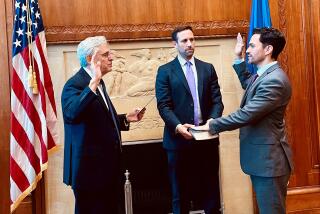Justice Dept. Paid Lucas as a Consultant
- Share via
WASHINGTON — The Justice Department paid William Lucas, its failed nominee to head the civil-rights division, more than $36,000 to prepare a 32-page report on how the department could improve coordination of its civil-rights efforts with states, local governments and outside groups, according to recently released documents.
The documents, obtained through the Freedom of Information Act, show that Lucas was paid for 128 days of work--most of it as he awaited Senate consideration of his nomination--under a consulting contract that paid him $284 daily. In addition, the government paid more than $9,000 for lodging and air fare on 28 trips to Washington from Lucas’ home in Detroit.
Lucas, whose nomination was rejected by the Senate Judiciary Committee last August, billed the government for working under the consulting contract nearly every workday last spring and summer, including days on which he met with members of the Judiciary Committee to discuss his nomination.
The only workday between April and August that Lucas was not paid for his work as a consultant--other than federal holidays--was July 19, the day he testified before the Judiciary Committee.
Last May, while the nomination was pending, the Associated Press quoted Justice Department spokesman David R. Runkel as saying that Lucas was not paid consulting fees for the days he spent paying courtesy calls on senators. However, the documents show that Lucas billed the government on at least five days he met with members of the Judiciary Committee.
In addition, Justice Department spokeswoman Deborah Burstion-Wade said she had spent time helping Lucas prepare for the confirmation hearings and study civil-rights law though “moot court-type” exercises.
Asked about the payments to Lucas for every workday except the day of his committee testimony, Runkel said: “There are 24 hours in a day.”
Runkel said nominees for Justice Department positions normally do not have their travel or lodging expenses paid by the department, but that it was not unprecedented. “From what I understand, everything was handled according to regular procedures for hiring a consultant,” he said. “When the Post hires a consultant they probably pay his traveling expenses, and that’s what the government does.”
Lucas now serves as director of the department’s Office of Liaison Services.
The report, for which Lucas interviewed 12 department officials and six representatives of police organizations, found that “potential civil-rights violations are not comprehensively reported to the Justice Department by state and local government agencies” and recommended greater coordination with state and local law enforcement.
“There should be a great deal more effective proactive activity in place, as relates to state and local law-enforcement agencies,” Lucas wrote. “A need exists to identify and define the existence and severity of universal violations and to identify the unique needs and requirements for additional education and training. All of which, if increased, might serve to render the division’s resources more effective in pursuit of its mission.”
Most of the report--20 pages--is devoted to an explanation of the organization of the civil-rights division, the roles of its eight sections, and their dealings with state and local law-enforcement agencies.
Runkel said the report had been given to the civil-rights division and Atty. Gen. Dick Thornburgh, but he had no information on whether any of Lucas’ recommendations had been implemented. “I think, obviously, to get his views on where improvements could be made in our operations, it is a low price for a consultant’s report,” Runkel said.
More to Read
Sign up for Essential California
The most important California stories and recommendations in your inbox every morning.
You may occasionally receive promotional content from the Los Angeles Times.












